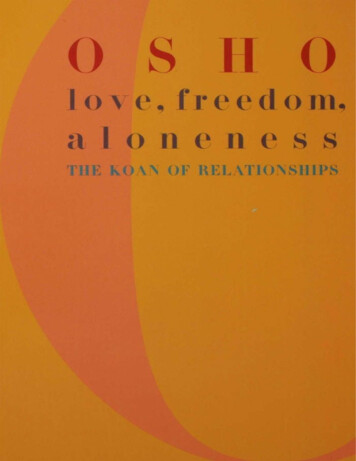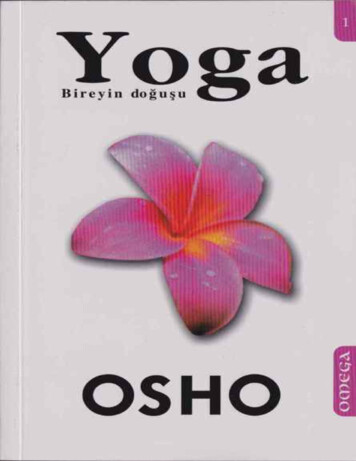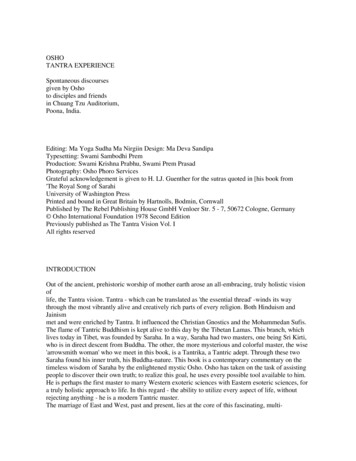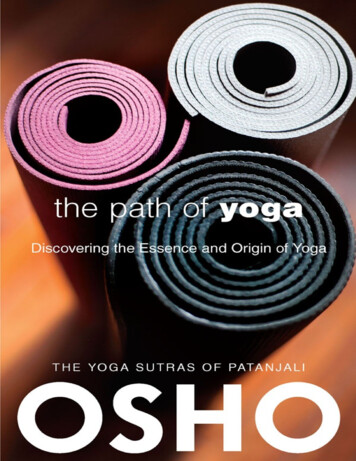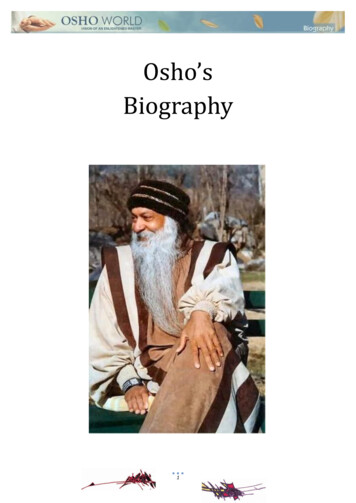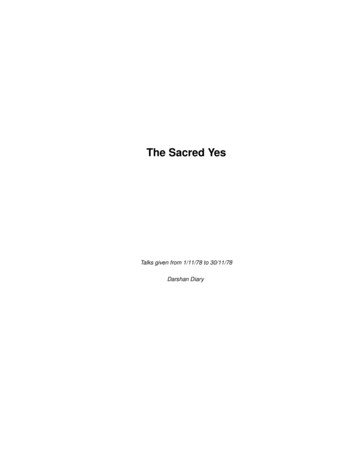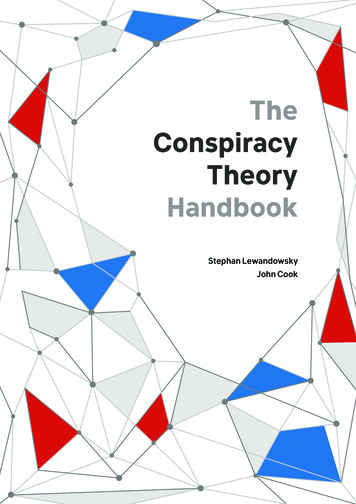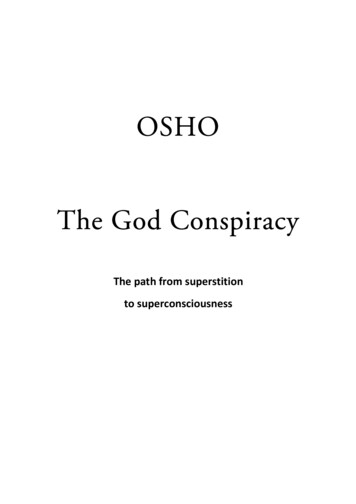
Transcription
OSHOThe God ConspiracyThe path from superstitionto superconsciousness
PrefaceThe skeptical mind is one of the most beautiful things in the world.It has been condemned by the religions because they were not capable of answering skepticalquestions; they wanted only believers.And the skeptical mind is just the opposite of the believer.I am all in favor of the skeptical mind. Do not believe anything unless you have experienced it.Do not believe anything -- go on questioning, however long it takes.Truth is not cheap. It is not available to the believer; it is available only to the skeptical.Just remember one thing: don't be skeptical halfheartedly. Be a total skeptic. When I say be atotal skeptic, I mean that your skeptical ideas should also be put to the sametest as anybody else's beliefs. Skepticism, when it is total, burns itself out because you have toquestion and doubt your skepticism too. You cannot leave your skepticism without doubt;otherwise that is the standpoint of the believer.If you can doubt the skeptic in you, then the mystic is not far away.What is a mystic? -- one who knows no answer, one who has asked every possible question andfound that no question is answerable. Finding this, he has dropped questioning. Not that he hasfound the answer -- he has simply found one thing, that there is no answer anywhere.Life is a mystery, not a question. Not a puzzle to be solved, not a question to be answered but amystery to be lived, a mystery to be loved, a mystery to be danced.A totally skeptical mind is bound to finally become a mystic; hence, my doors are open for all. Iaccept the skeptic because I know how to turn him into a mystic. I invite the theist because Iknow how to destroy his theism. I invite the atheist because I know know how to turn him into amystic. I invite the theist because I know how to destroy his theism. I invite the atheist because Iknow how to take away his atheism. My doors prevent nobody, because I am not giving you anybelief. I am giving you only a methodology, a meditation to discover for yourself what in realityis the case.
I have found that there is no answer. All questions are futile, and all answers are more futile.Questions have been asked by foolish people, and great philosophies have arisen because oftheir questions. These philosophies are created by the cunning and the shrewd.But if you want to have a rapport with reality, you have to be neither a fool nor shrewd. Youhave to be innocent.So whatever you bring -- skepticism, atheism, theism, communism, fascism, any type ofnonsense you can bring here -- my medicine is the same.It does not matter what kind of nonsense is filled in your head when you come here. I will chopyour head without any distinction. Who is sitting on your head does not matter -- my concern ischopping!I am just a woodcutter.CAN YOU SAY SOMETHING ABOUT DOUBT AND NEGATIVITY?WHAT IS THE DIFFERENCE?The difference between doubt and negativity is great.They look alike; on the surface they have the same color, but deep down the difference isunbridgeable.First, doubt is not negativity; neither is it positivity. Doubt is an open mind, without anyprejudice. It is an inquiring approach.Doubt is not saying anything, it is simply raising a question. That question is to know, to findwhat the truth is.Doubt is a pilgrimage. It is one of the most sacred values of human beings.Doubt does not mean no. It simply says, "I do not know, and I am prepared to know. I am readyto go as far as possible, but unless I myself come to know, how can I say yes?"Negativity has already said no. It is not inquiry. It has come to a conclusion, the same waysomebody has come to the conclusion to say yes. One man says God is; his statement is positive.
The other says there is no God; his statement is negative. But both are sailing in the same boat,they are not different people. They have not inquired.Neither the theist has doubted nor the atheist has doubted; both have accepted borrowedknowledge.Doubt says that, "I myself would like to know, and unless I know for myself, it is not knowledge.Only my experience is going to be decisive." He is not arrogant, he is not denying anything. He isjust open for inquiry.Doubt is not disbelief -- that's how religions have been confusing people. They confuse doubtwith disbelief. In fact disbelief and belief are exactly the same. Both accept knowledge fromothers, from books, from masters. And remember, anything that you do not know, yet you havestarted believing or disbelieving in it. you have missed a great opportunity for inquiry. You haveclosed the doors already, by yes or by no. You have not traveled.It is easier to say yes, it is easier to say no, because there is nothing you have to do.But to doubt needs guts. To doubt needs courage to remain in the state of not-knowing, and goon questioning everything till the moment you yourself arrive at the reality.When you come to the reality there is no negativity, no positivity. You simply know -- it is yourexperience. I will not say it is positivity because positivity always has the other pole of negativity.An experience goes beyond both; the whole world of polarities is transcended. That is truewisdom.Doubt is the way to truth. No or yes are not ways, they prevent you.It will look very strange, that yes does the same thing as no. In dictionaries they are opposites,but in reality they are not. They look opposite only, but both have not asked the question. Bothhave not tried to find out what the case is.The communist believes, exactly as the catholic believes. The communist believes that there isno God. You can call it disbelief, but it is his belief. He has not inquired, he has not meditated; hehas done nothing to find out that there is no God. The theist says there IS God. He has also donenothing. Both have chosen without moving an inch towards truth. That's why a very strangething happens: the person who is a theist, a believer, can become a disbeliever, an atheist, in asingle moment; and vice versa.Before the revolution in Russia, Russia was one of the most theistic, religious countries of theworld. Millions of people in Russia could have sacrificed their life for God. Afterthe revolution, when the authority changed, when the priest changed, when The Holy Bible wasreplaced by the holy DAS KAPITAL, within ten years the whole country became atheist.
It was amazing! People who had believed their whole life that there is God started disbelieving.Even communists could not understand that these people are the same people who could havedied for God -- and now they are ready to die for no-God. Nobody has analyzed the situation upto now, what happened there. This is the analysis of the fact:negativity and positivity are both belief systems.Doubt is against both. Doubt is the insistence of the individual that he wants to taste, toexperience the truth. He is not ready to accept it from anybody else, this way or that.They are very, very rare people who doubt.But let me say to you: Blessed are those who doubt, because they shall inherit the kingdom oftruth.It is arduous to doubt, it is risky, it is dangerous. One is going into the unknown, with nopreparation, with no prejudice. He is entering into the dark hole, not even believing that therewill be the other end of the tunnel, and he will again come out of darkness. There is no belief; hesimply takes the challenge. There is only a quest, a question. He himself becomes a question.It is very consoling to have the answer, and if it is freely available, as it is. Jesus says, "Justbelieve in me and you need not bother: I will take care. I will choose you at the day of judgment.I will recommend you to God: These are my people -- they should be allowed in paradise.' Allthat you have to do is believe."A real shortcut -- simple belief. That's why thousands of people around the world have believed,and thousands of others have disbelieved. Their sources are different but the basic approach isthe same. In India there has been a very ancient philosophy, charvaka. That philosophy saysthere is no God, no heaven, no hell, no punishment for your bad actions and no reward for yourgood actions. And thousands have believed in it. It is negative, absolutely negative, but verycomfortable. You can steal, you can murder, you can do anything you like; after death nothingsurvives.In many ways the West has lagged behind the East, particularly as far as religion, philosophy,culture, are concerned. Charvaka is a five-thousand-year-old ideology; Karl Marx just in the laststage of the previous century said there is no God. He was not aware of charvaka, he thought he
had come to a great discovery. For five thousand years charvakas have already been saying that;but they had not inquired.The man who created the philosophy was Brihaspati -- must have been a man of charismaticpersonality. He convinced people that you can do anything you want to because the thief, themurderer, the saint, all fall: dust unto dust. And after death nothing is left; the saint disappears,the sinner disappears. So don't bother at all about afterlife, there is none.This is not inquiry, because charvakas and their master Brihaspati have never gone beyonddeath. According to their philosophy, if they had gone they would have not come back -- so onwhat grounds do they say that there is nothing left? Nobody has visited the land. But it is veryeasy to believe. His famous statement is worth quoting.Brihaspati says, RINAM KRITVA GHRITAM PIVET: "Even if you have to borrow money, borrow it,but drink ghee as much as you can" -- because after death you are not going to be questioned,punished. The person who had given you money cannot drag you into the court of God; thereare no such things. His whole philosophy is simply, "Eat, drink and be merry." You can believe init -- the theists will call it Disbelief.And that's what Karl Marx did for the communists, he said that there is no soul, noconsciousness. It is a by-product of matter, so when the body falls apart, nothing is left.This became a very dangerous attitude, because communists could kill people without thinkingtwice.Their belief is that by killing you are not committing any sin. There is nobody inside a person;there is no inside. A man is chemistry, biology, physiology -- but there is no soul. Joseph Stalincould kill almost one million people after the revolution without feeling even a slight doubtabout what he was doing.In Soviet Russia man has been reduced to a mechanism. You can kill -- nothing is killed, becausethere was nobody in the first place. It is just like a clock functioning. It moves, it shows you thetime; that does not mean that there is somebody inside. You can take the clock apart and youwill not find anything.I have heard. Once Mulla Nasruddin's clock stopped. It was an old clock, and some dayeverything has to stop. He opened the clock and found there a fly, dead. He said,"Now I know the clock is dead -- this is the clock's soul!" He was just going to bury the clock inthe garden when his wife caught hold of him.She said, "What are you doing? Have you gone mad? Clocks are not buried, graves are not madefor them!"
Nasruddin said, "Those people have never known what I have come to know. The clock stopped;certainly I thought it was dead. I looked at it, opened it, and found its soul dead. This is the soul"-- he was holding the fly in his hand; he said, "This is the soul."The wife said, "You are simply an idiot, and you will always remain an idiot! Bring that clock out.Perhaps it needs oiling, some repair work -- it is an old clock. And clocks don't die, because todie first one has to live: clocks don't live!"But that's what Karl Marx has preached to the communists, that man is also just like a clock. Andnow almost half the world believes in Karl Marx. Strange -- these same people had believed inGod. Russians, Chinese, Indians, Mohammedans -- all kinds of people change their yes to no. Tochange yes into no is so easy because they are not different. Basically they give you aconsolation without the arduous journey to truth.I have asked many communists, very old communists. In India, S.A.Dange was a member ofthe international communist party along with Lenin, Trotsky, Stalin. He was an eyewitness of theRussian revolution. I asked him, "Have you ever meditated?"He said, "Meditated -- for what? Why should I meditate?"I said, "If you have never meditated, then you don't have the authority to say that there is nosoul, no God, no consciousness. Without going inside yourself, how can you say that there isnobody? And see the absurdity of it: who is saying that there is nobody? Even to deny you willhave to accept that there is somebody. Even to say that there is nobody, somebody has to beassumed."The same is the situation of religions.Nobody has encountered God -- no Christian, no Hindu, no Mohammedan -- but they have allsaid yes because the crowd in which they were born was the crowd of theists.To say no amongst that crowd would have created difficulties for them. Yes was simply theaccepted rule of the game. They have worshipped, they have prayed, not knowing why theywere doing it. But everybody else is doing it so it must be right.When the crowd changed -- for example in Russia, the same people who were so certain of Godbecame uncertain. It took ten years to change from one certainty to another certainty. aninterval of uncertainty, but uncertainty is not doubt. Doubt is simply a question, and doubt says,"I want to KNOW." It has no ideology.Doubt is absolutely pure quest.You have asked, "What is the difference between doubt and negativity?"
Negativity and positivity are both the same. Doubt is different from both. It does not make you atheist, it does not make you an atheist. Positivity makes you a religiousbeliever, a theist; negativity makes you an unbeliever, irreligious, an atheist. Doubt does notmake you anything. It simply makes you an inquirer. And that is the dignity of man.I teach you doubt because I know if you can doubt to the very end you will realize the truth ofyour own being, and simultaneously the truth of the whole existence. And that will beliberation, that will be freedom.Doubt is neither Christian nor Hindu, nor American nor German. Yes may be Hindu, yes may beMohammedan, yes may be Christian; no may be communist, no may be fascist -- but doubt issimply a quest, an individual quest.Yes and no both belong to the crowd. Doubt makes you assert your individuality. You startfinding your path on your own. You don't accept the maps given you by others.It is cheap to believe, it is cheap to disbelieve. But it is really a dangerous journey to know.I would like my sannyasins neither to be negative nor to be positive, but open, available, with aquest, a question mark, and to go on searching.Many times your mind will say it is good to believe -- because the journey is arduous, and onenever knows where one is going, whether one is going to find anything or not.But don't listen to the mind.Mind has created all these "yes" philosophies, "no" philosophies.Doubt has never created any philosophy; doubt has created science. And doubt is going tocreate religion.They are exactly the same -- the same application of doubt in different fields.About objects, the outside world that spreads to millions of stars, doubt has given tremendousinsight just within three hundred years. You are carrying another world within yourself, which isin no way smaller than the world you see outside; perhaps it is bigger. Why do I say that perhapsit is bigger? I am including the word perhaps' so that you should not believe. I know it is bigger,for the simple reason that you know the stars, you know the sun, you know the moon -- but themoon does not know you, the sun does not know you. The stars are great, the universe is vast,but you are the only knower. You have something more than the whole universe.That's why I say inside you are carrying something bigger than the universe, more than theuniverse. Just inquire.One of the most beautiful men of this century was Maharishi Raman. He was a simple man,uneducated, but he did not accept the ideology, the religion in which he was born. When he wasonly seventeen years of age he left his home in search of truth. He meditated for many years in
the hills of Arunachal in south India, and finally realized himself.After that his whole teachingconsisted only of three words, because those three words had revealed to him the wholemystery of existence. His philosophy is the shortest. What are those three words? Whoevercame to him -- because as he became slowly slowly known, people started coming to him fromall over the world -- his whole teaching was to sit silently and ask only one question: "Who amI?" and go on asking that question.One day the question will disappear, and only you will be there. That is the answer. Not that youwill find the answer written somewhere; you will find yourself. You just go on digging with thisquestion -- this question is like digging -- but do you see the question? It is a doubt: Who am I? Itdoes not accept the spiritualist who says you are a soul.It does not accept the materialist who says there is nobody, don't waste time; eat, drink and bemerry. He doubts. Those three words are followed by a question mark: Who am I?And he says this is enough. If you can go on and on and on patiently, one day the questionsuddenly disappears and what is left is your reality. That is the answer.And the moment you know yourself you have known everything that is worth knowing.Are you against God and Jesus Both?I have been searching and seeking Him everywhere.And this is my finding -- that He is notanywhere.I have looked in, I have looked out; I have done everything that ispossible to be done. There is no God. This is a simple statement of fact, with no anger, with noenmity. What can I do if He does not exist? It is not my fault.But man's mind wants some extreme position. It is worth understanding.Why does man's mindwant some extreme position?Either you have to be theist or atheist; either you have to be for or against. It does not allow youa third alternative. The reason is simple: the third alternative becomes the death of the mind.Mind lives on extremism; that is its very nourishment.
Exactly in the middle, where two polarities dissolve and contradictions meet, mind simply goesout of function. The mind cannot conceive how contradictions can meet, howpolarities can be one. But in existence they are meeting, they are one. Have you seen life anddeath separate? It is your mind that makes the categories and words separate. But look intoexistence -- it is life turning into death death turning into life. There is no division, they are partof one whole. It is the mind that has created the idea of beauty and ugliness. But in existence.do you think that if all human minds for a moment disappeared from the earth -- would there bebeauty in anything, ugliness in anything?Would the rose still be beautiful? No, as the mind is not there, there is nobody to judge andbeauty and ugliness are mental judgments.The rose will be there, just as the thorn will be there, but there will be no evaluation becausethe evaluator is not there. They will both exist without any hierarchy. The rose will not be higherthan the thorn. The flower of the marigold will not be a poor flower and the rose, a rich flower;they will be on the same plane.All hierarchy is created by the mind: the lower, the higher, for and against.Think in another way: for a moment, let the mind be there but drop judgment -- which is a littlemore difficult. You can visualize a state where all minds have disappeared and certainly you cansee there is no possibility of anything being ugly, beautiful. Things will be there, just themselves,with no comparison, no judgment, no labeling.Now try the other, which is a little more difficult. Let the mind be there -- so all the minds arethere but nobody is judging -- for one hour, no judgment. Can beauty be there, can ugliness bethere? Can something be moral and something immoral? Can there be a sinner and a saint?For that one hour, all these categories will disappear and you will have, for the first time, a realcontact with reality as it is, not as projected by you, manufactured by your mind. Your mind iscontinuously manufacturing reality; otherwise, who is a saint and who is a sinner?Man's mind is easily ready for any extreme because the extreme is its life-force. When twoextremes meet, they cancel each other and they leave a vacuum. That's the meaning of themiddle way: let the extremes come to a point where they cancel each other and suddenly youare left neither atheist nor theist. Those questions become irrelevant. But the mind is not readyto drop either in religion, in philosophy, or even in science.Recently i watcheda documentary film on the history of mathematics. The whole history ofmathematics can be said to be the whole problem of the human mind. For two
thousand years or more in the West and for five to ten thousand years in the East,mathematicians have been trying to find the ultimate science.One thing is certain in their eyes, that only mathematics can become the ultimate science, forthe simple reason that there are no mathematical things around you. It is a pure science. Youdon't see mathematical objects: this is a mathematical chair and that is a mathematicalhouse.Mathematics is just a pure ideological game. It consists not of things but ideas. Andbecause ideas are properties of your mind, you can refine them to their ultimate purity.So it has been an accepted thing that mathematics can become the purest science possible. Butthere have been problems. Those mathematicians were not aware that your mind itself is theproblem, and the mind is going to create a science which will have no problems, nocontradictions, no paradoxes.You can play the game. You can make a great edifice but whenever you look at the base, you willknow that at the very base the ultimate problem remains unsolved. For example, Euclid'sgeometry. I could not go much into it for the simple reason that I could not agree with thebasic hypotheses.My teacher of geometry simply told me, "Your problem has nothing to do with me. Find Euclid -get out of the class. Find Euclid and settle things with him. I am a poor teacher, I just get mysalary; I have nothing to do with his fundamental axioms. Whatever is written in the book, Iteach. I am not interested at all whether his fundamental hypotheses are right or wrong. You getout.He wouldn't allow me in the class. I said, "But how can you go on teaching year after yearknowing that the basic points are absurd?"He said, "I never knew; it is you who is hammering on my mind that they are absurd. I havenever bothered; I am not a scientist nor a mathematician, just a poor teacher.And I never wanted to be a teacher, I wanted to be an inspector, but they didn't choose me. Itried to be an inspector, but they didn't choose me. I tried other jobs; everywhere no vacancy. Itis just out of compulsion that I am a teacher here."Don't torture me. Your problem is with Euclid -- don't bring me in. If you want to read what iswritten in the book, I am ready. But if you tell me that the fundamentals are wrong."I said, "I cannot go on unless I am certain about the base, because this is dangerous: thefoundation of the house is missing and you tell me to go on up in a skyscraper. I cannot move asingle inch. First I have to be certain about the foundation, whether the foundation is there
which can support this skyscraper. You are going to fall -- that is your business -- but I am notgoing to fall with you. If you want to commit suicide, do it."He said, "This is strange! With Euclid, nobody commits suicide. What are you talking about?"I said, "I am talking about exactly what I said. It is suicide. Not a single hypothesis of Euclid's isexplainable."And still for two thousand years Euclid has been the foundation, not only of geometry but of allother sciences, because he has to be used in other sciences too. He says about a line, itsdefinition, that it has only length -- only length.I asked my teacher, "Draw a line which has only length. The moment you draw it, it will alsohave some breadth, howsoever tiny." And a point, according to Euclid, has no length, nobreadth. I said, "Make a point which has no length and no breadth. And the same Euclid says aline consists of points -- one point after another point, in a row.Now, a line has only length the point has no length, no breadth -- then how can the line havelength? because it has only points standing in a queue. From where does the length appear?"He just folded his hands to me and said, "Simply go from here. I have told you that I am just apoor teacher and you are beyond me."I said, "This is not the answer. You can simply accept that these axioms are not explainable."But the mind has some difficulty in accepting the idea that something is there which is notexplainable. Mind has a very mad urge for everything to be explained. if not explained, then atleast explained away. Anything that remains a puzzle, a paradox, goes on troubling your mind.The whole history of philosophy, religion, science, mathematics, has the same root, the samemind -- the same itch. You may scratch yourself one way, somebody else may do it differently,but the itch has to be understood.The itch is the belief that existence is not a mystery: mind can only feel at home if somehowexistence is demystified.Religion has done it by creating God, the Holy Ghost, the only begotten son; different religionshave created different things. These are their ways to cover up a hole which is uncoverable;whatever you do the hole is there. In fact the more you cover it, the more emphatically it isthere. Your very effort to cover it shows your fear that somebody is going to see the hole.It used to happen in my childhood every day because I love to climb the trees: the higher thetree, the greater the joy. And naturally I fell many times from the trees; I still carry on my legsand knees and everywhere, scratches. Because I was continually climbing the trees and falling,every day my clothes were torn, and my mother would say, "Don't go out with that hole in yourclothes. Let me do a little patchwork."
I said, "No, no patchwork."She said, "But people will see that you are the son of the best cloth merchant in the town, thatyou are always roaming around the whole town with torn clothes; and nobody takes care."I said, "If you patch it then it becomes ugly. Right now anybody can see it is fresh. I did not comeout of the house with this hole. This is fresh, I have just fallen from a tree.But with your patchwork. this is an old thing that I have been hiding. "Your patchwork willmake me look poor, my torn shirt simply makes me look courageous. Don't be worried about it.But the whole history of mind, in different branches, has been doing this patchwork -particularly in mathematics because mathematics is purely a mind game. There aremathematicians who think it is not, just as there are theologians who think God is a reality. Godis only an idea. And if horses have ideas their God will be a horse. You can be absolutely certainit will not be man, because man has been so cruel to horses that man can only be conceived as adevil not as God. But then every animal will have its own idea of God, just as every human racehas its own idea of God.Ideas are substitutes for where life is mysterious and you find gaps which cannot be filled byreality. You fill those gaps by ideas; and at least you start feeling satisfied that life is understood.Have you ever thought about this word "understand? It means standing under you. It is strangethat this word has by and by taken a meaning which is far fetched from the original idea:anything that you can make stand under you, that is under your thumb, under your power,under your shoe, you are the master of.People have been trying to understand life in that same way, so that they could put life alsounderneath their feet and declare, "we are the masters. Now there is nothing which is notunderstood by us."But it is not possible. Whatever you do life is a mystery and is going to remain a mystery. Even ifyou I mean man someday comes to understand the whole of life, a new problem will arise:"Who is this man, this mind, this consciousness which has understood everything? From wheredoes it come?"In that documentary film one thing will be helpful to you. One of the mathematicians in thebeginning part of the century -- a very famous mathematician, one of the greatest in the wholehistory of mathematics -- Freger, was doing the same work. His whole life he had devoted tocreating a mathematical system which dissolves all paradoxes, all mysteries, all puzzles, andsolves everything -- the ultimate solution.
And he was just going to publish it -- it is published now and it is a tremendous task that he hasdone. But Bertrand Russell -- a young man at that time, and not very famous, just a little bitknown as a philosopher in philosophical circles -- was also interested in mathematics. Later onRussell wrote one of the monumental books on mathematics, PRINCIPIA MATHEMATICA, inwhich three hundred and sixty-two pages are devoted only to proving a simple problem: oneplus one is equal to two.The book is just impossible -- to go on trying to read it is enough to drive anybody crazy! EvenBertrand Russell accepted that "after writing that book I have never been so sharp again; mywhole sharpness got lost." Certainly he put too much energy into it, and a strange kind ofenergy; nobody reads that book.Bertrand Russell was interested in mathematics. Knowing that Freger was going to publish abook which was going to solve all paradoxes, mysteries, and mathematical problems, he sent aparadox to this great mathematician who was trying to solve all gr
OSHO The God Conspiracy The path from superstition to superconsciousness . Preface The skeptical mind is one of the most beautiful things in the world. . others, from books, from masters.
